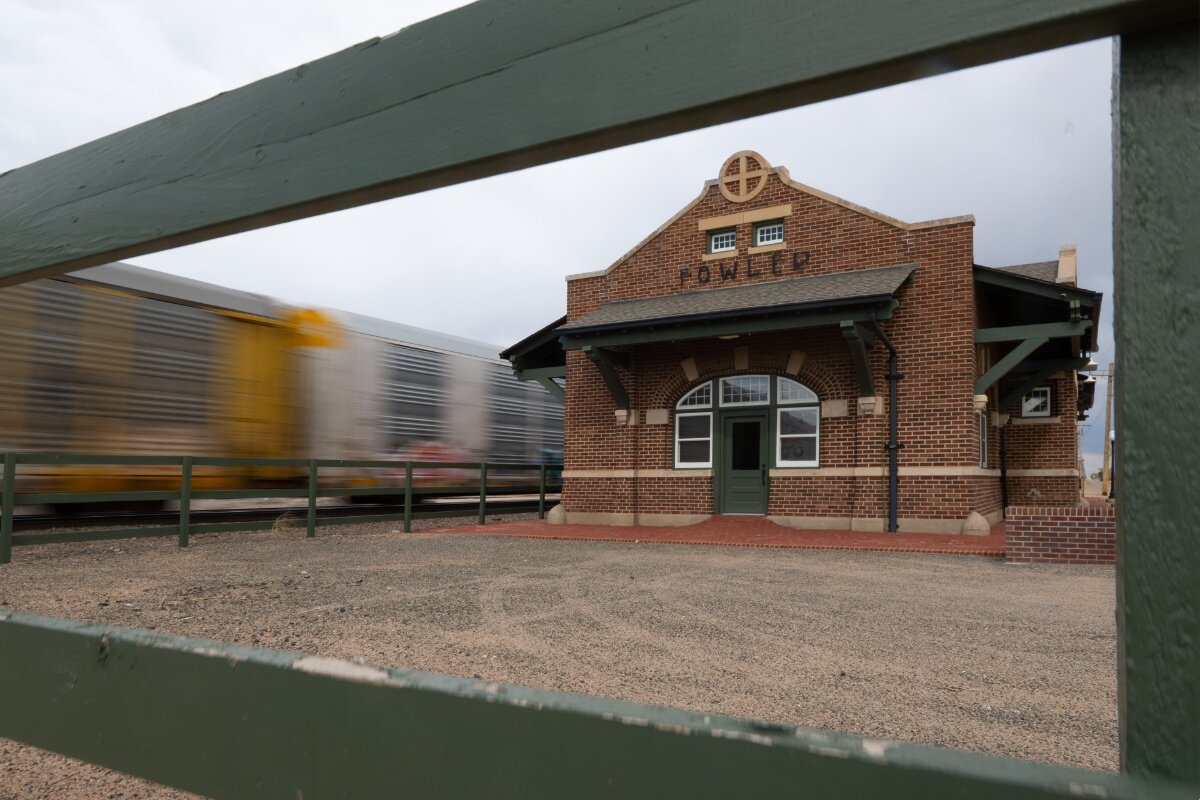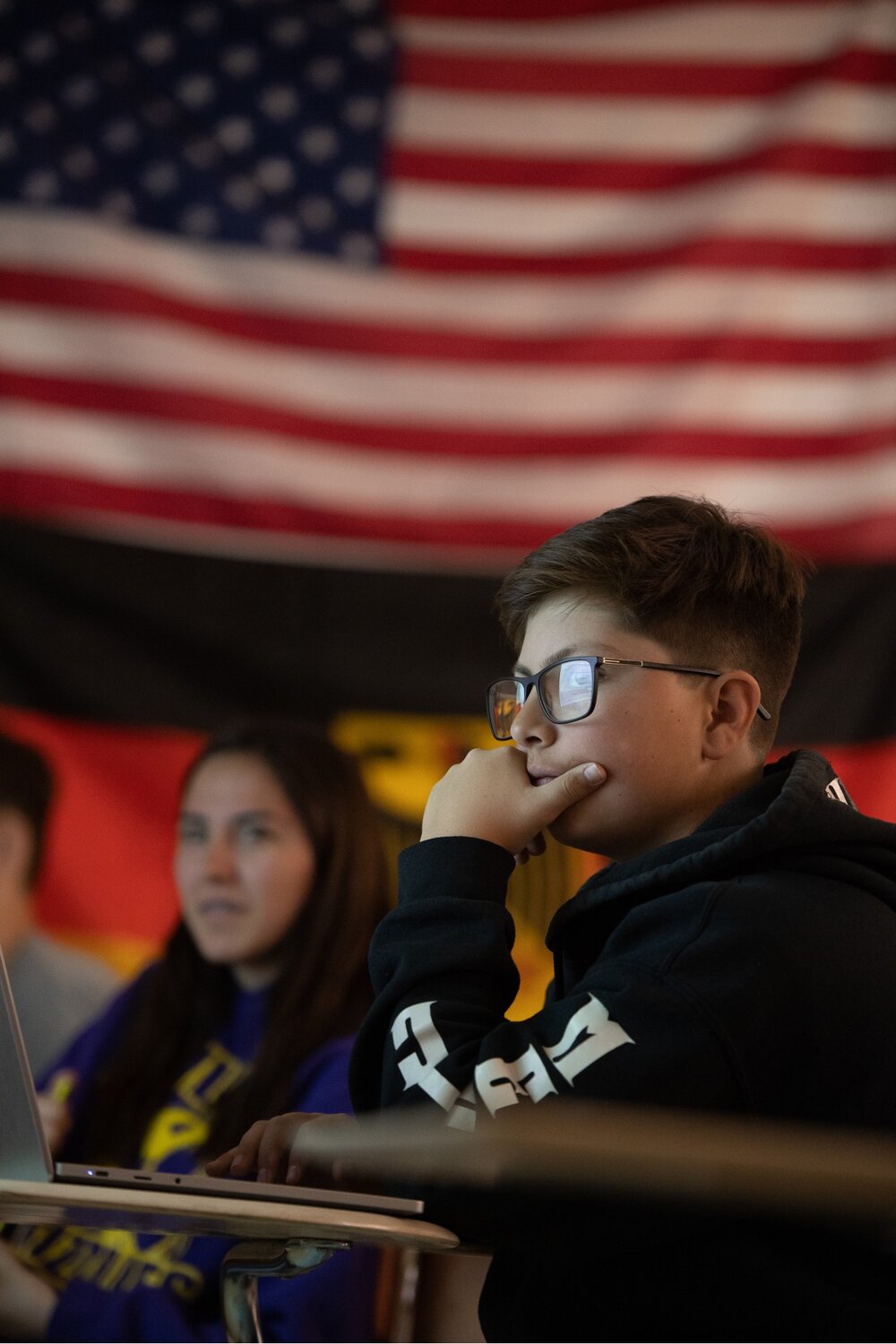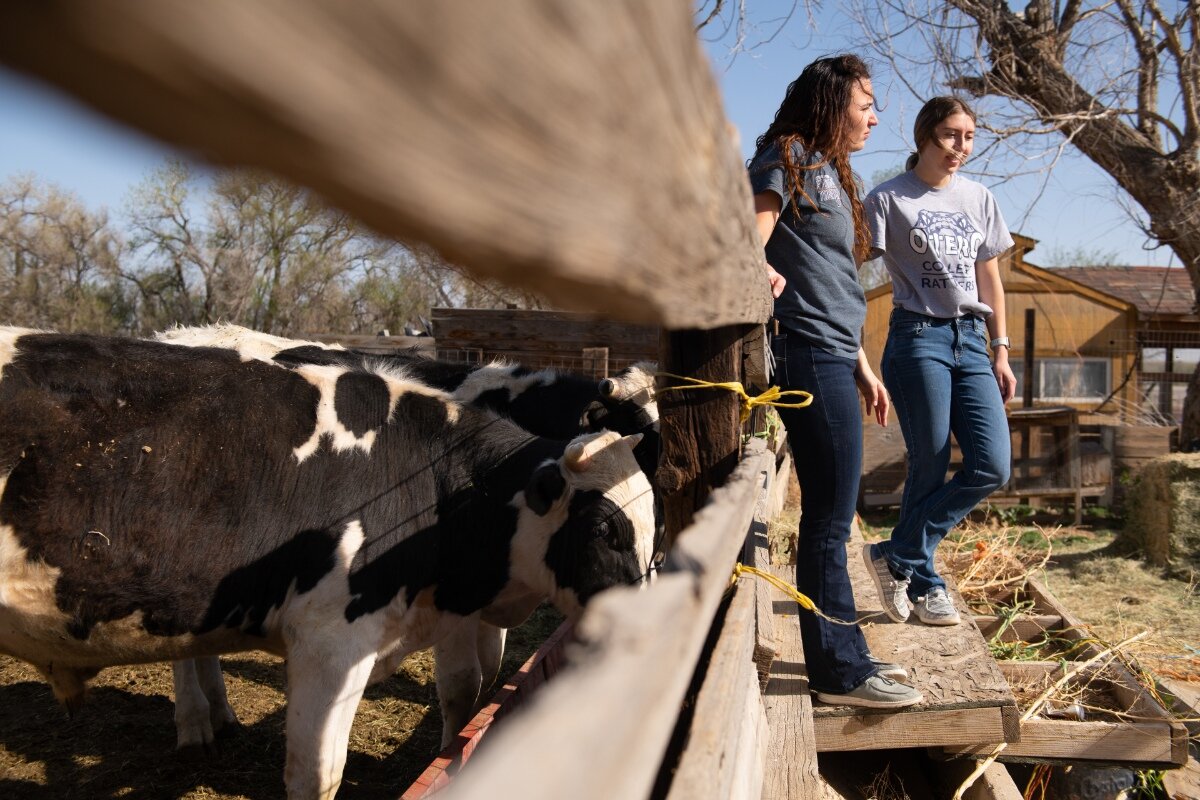Rural Colorado students go to college at low rates. Tiny Fowler goes against the trend.

Sisters Shaelea and Ryanna Pruett can rattle off plenty of facts about raising cattle.
The Fowler High School graduates know the ideal build for a bull and how to bottle-raise a calf. The sisters could try to make a living on their family ranch tucked between Manzanola and Fowler on Colorado’s southeastern plains.
Instead, their father Dane Pruett Jr. stressed college from an early age. He worked hard labor jobs at a cannery, steel mill, and farms throughout his life, but wanted his daughters to find work that would provide them flexibility and financial stability and wouldn’t tax their bodies.
“He wants a more comfortable life for us,” said Shaelea Pruett, 20, who graduated from Otero College and will attend Colorado State University Pueblo in the fall.
Shaelea Pruett wants to be a large-animal veterinarian, a high-growth field as an older generation retires. Her younger sister, Ryanna Pruett, 18, is studying at Otero College and plans to be an agricultural sciences teacher, preparing the next generation of farmers and ranchers.
Fewer than half of rural Colorado’s high school graduates go to college, a rate that's about five percentage points below the state average.
The reasons are complex. College can feel far away, geographically and culturally. Colleges sometimes haven’t done enough to make degrees feel relevant to the interests and experiences of rural Coloradans. The cost can deter students unsure if college will improve their earnings. College recruiters don’t often stop at rural high schools.
Fowler fosters a college culture
Tiny Fowler, with its lone high school of about 110 students, shows how rural communities can use a partnership among educators, parents, and the broader community to foster the idea that college degrees will contribute to success — whether graduates return to Fowler or move to a bigger city.
Students go to college at higher rates than the state. In 2018, 21 of its 25 graduates went to college. In 2019, the school sent 26 of its 32 graduates to college. And in 2020, when many students put off postsecondary plans due to the pandemic, the school still sent 14 of its 23 graduates to college. About half the students who went to college qualify for a Pell grant, or federal money for college students with a financial need.
Agriculture dominates in Fowler, a community of about 1,150 residents, with farms and ranches dotting the valley on either side of the Arkansas River. Just up the road, the Crowley County Correctional Facility provides some jobs. In town, residents can work at the bank or the market. Those jobs don’t necessarily require employees to have degrees.

Yet, college has been a way of life in Fowler for generations. Residents aren’t sure when college became a priority, although some say it’s likely due to early settlers in the late 1800s who sent their children to college to become teachers or business owners.
What’s clear is the college-going culture has persisted. In 1916, Mathias Hermes created a scholarship trust to help Fowler students cover living expenses while at college. More than a century later it still provides about $100 a month to two scholarship recipients.
“People who live here really encourage our kids,” said Town Manager Kelly Lotrich, who lived in Albuquerque before returning home with her family. “When they say it takes a village — it really does have that feel.”
The community expects the school district to ensure students can connect to more than just what the town has to offer, said Fowler School District R-4J Superintendent Alfie Lotrich, Kelly Lotrich’s cousin-in-law.
“There’s literally not a lot of opportunity here,” Alfie Lotrich said. “So it almost kind of forces students to look at furthering their education in some form or fashion.”
Some students leave after high school while others return after college. The education they bring back helps them become town leaders, like the Lotriches. They educate the next generation. They commute to nearby cities where jobs require more training. Or their education helps them start businesses of their own like diesel mechanic shops or use the newest technology to grow food and raise animals.
Fowler prepares students for life after high school
“It’s expectations,” explained Fowler Jr. and Sr. High School Principal Russell Bates. Those expectations — whether it’s behavior or how to prepare for life after high school — are taught to students throughout their school career.
For Bates, it helps that most educators at the school were once in the same place as his students. Many teachers are Fowler graduates, and the expectations remain the same — for students to fulfill their potential and ensure that high school is just the start. Teachers and the community push exploring outside of Fowler.
When Ryanna Pruett needed to intern at a school district for a student teaching requirement, she chose Fowler, but teachers questioned why she didn’t pick another district where she could learn about other communities.
“They are very encouraging in pushing us to go explore,” she said.
With limited job opportunities in the area, Bates said, everybody needs a plan. And college can be central to that.
“I graduated from here in 1987 and those things were non-negotiable then,” Bates said.
Sonja Ardoin, an Appalachian State University professor who studies rural college-going patterns, said schools must also match expectations with preparation.
“Rural students who are not necessarily finding out about college options until their junior or senior year of high school are sort of playing catch up in terms of gathering college knowledge,” she said.

A couple returns home to prepare students for college
The Pruett sisters heard about college from educators at an early age. Their teachers had them map out how to reach their dreams. For instance, Shaelea Pruett said she dreamed of becoming a surgeon, and teachers helped her figure out how to get there.
At the center of many of those conversations are Donna and Mike Aragon, who have been a two-person college machine in Fowler for about 20 years. The husband-and-wife pair worked in higher education before returning home to Fowler to raise their family.
Guidance director Donna Aragon coordinates students’ plans after high school. IT director Mike Aragon teaches senior seminar and prepares students on the ins and outs of college.
Together they educate students on the costs of college, ensure they understand and submit the Free Application for Federal Student Aid, and teach them about what it takes to not only go to college, but deal with living expenses.
“We know every kid,” Donna Aragon said. “And we know every kid’s story.”
Mike Aragon leads students in a game of life in which students must manage their income, expenses, and life scenarios. The Pruett sisters said the game taught them a lot about life choices and managing your money.
The Aragons said teachers want to ensure every student has the tools they need to succeed in life and in college.
Former students include ranch managers, diesel mechanics, a Colorado State University Fort Collins admissions counselor, a video game designer, teachers, and accountants.
The school requires students to submit weekly job applications or scholarships to prepare them for life after high school. Every year, the school announces at graduation the thousands of dollars students were awarded to go to college.
The school also offers dual-level classes so students can earn college credit while in high school.
Those classes open students’ minds to college opportunities. Sophomore Anahy Prieto, 16, said the agriculture classes have allowed her to go to competitions at college campuses and earn credit toward professional certificates. She wants to go to CSU Fort Collins to be a veterinarian.
“I feel like my heart belongs there,” Prieto said.
Both school districts and colleges have to foster college culture
The attitude Fowler has toward college is hard to replicate, said Cecilia Orphan, a University of Denver expert on rural colleges.
But it’s on both colleges and school districts to ensure not just students but entire communities know how college can benefit their lives in rural settings, she said. Colleges that don’t do a good job graduating students might earn a bad reputation within a community or turn families off to college. Schools that collaborate with rural communities help create more successful outcomes, she said.
“These communities know how to use resources in ways that make sense for their local economy that can improve the college-going culture, and create a more educated community,” she said.
Rocky Ford School District Superintendent Kermit Snyder said his community has mixed feelings about college. Some parents worry about their kids leaving the community, which sits about 20 miles east of Fowler, he said. It’s a common concern in rural areas, where college may be seen as contributing to declining population, rather than bolstering community sustainability.
For some families, Snyder said, “it’s just not a priority.”
He said he’d like to see more students explore college options, including career education and two-year opportunities. In the last several years, the district added a part-time employee to focus on connecting students to colleges and scholarships. That’s helped more students see college as an option, but most years college-going among his students has remained just about the same as the state average of 50.5%.
The district could use more help from colleges and universities, which haven’t consistently recruited students, Snyder said. Only recently did schools like CSU Fort Collins and the University of Colorado Denver start increasing their footprint in the surrounding areas.
When students get to campus, Snyder wishes more schools understood their rural backgrounds and made them feel welcome.
“They don’t get a personal touch from a college saying we want you to come here,” Snyder said. “And I think in many ways, when they do head to that four-year institution, they don’t get that personal touch.”
Colleges want to do more to educate rural Colorado
Colorado’s community college system has historically served the majority of the state’s eastern plains, but proximity to a college or university can be scattered. That can present huge hurdles for rural students when most students overall go to college within 50 miles of home, according to Ardoin.
Schools over the years have created satellite campuses to try to address those needs.
Additionally, lawmakers have increasingly allowed the state’s community colleges to offer students four-year degree programs such as nursing to help fill gaps in training.
Joe Garcia, Colorado Community College System chancellor, said a college education can help towns sustain and grow their economies. The state’s changing economy also impacts rural Colorado, he said. More jobs require a college degree, especially a four-year degree.
“You cannot sustain those communities with only agricultural workers,” said Garcia, who grew up in rural New Mexico. “You need people who understand tech, who understand programming, who understand internet security, who can start up businesses. They need to be able to rely on their ability to access the internet and not just their ability to access a tractor.”

But leaders at Otero College, about 30 minutes from Fowler, said it can be difficult for the college to sustain programs. With few job opportunities, the school has to be mindful that it shouldn’t train too many workers for a given industry.
That’s why the state community college system is creating a network called the Rural College Consortium that will ensure every community college can access each others’ programs. The network is meant to address the sustainability of programs that have a broader appeal across the state.
For example, the consortium will allow students in Otero County the ability to attend classes remotely that are only offered at Colorado Northwestern Community College in Rangely. Schools also will share other resources, such as tutoring and mental health resources.
In recent years, four-year universities have also tried to do more to attract rural students or bring their programs closer to them.
CSU Fort Collins and University of Colorado Boulder have created regional partnerships so students in remote parts of the state can attend some of their degree programs.
Blake Naughton, CSU vice president for extension and engagement, said leaders at the university, founded to serve as the state’s agricultural school, have tried to refocus its efforts so the school’s teachings are relevant to a new generation of rural communities. That can look different in different parts of the state, where the economy might turn on agriculture or recreation and tourism or oil and gas development. The university has also invested in additional satellite campuses, such as in Rocky Ford, that help provide students connections to degrees, but also non-credit education courses for adults. The school also opened a campus in Orchard Mesa on the western slope.
Also on the Western Slope, Colorado Mesa University has gone door-to-door to recruit students. Colorado Mountain College, which serves mountain communities, has added programs such as avalanche science to ensure it’s meeting the needs of the communities it serves.
Leaders at CSU Pueblo, about 40 minutes west of Fowler, said they’ve beefed up recruitment by sending more admissions counselors to rural communities. The school also plans in the fall to make college free for families making less than $50,000 a year.
Chrissy Holliday, CSU Pueblo vice president of enrollment management, said the school has always tried to bring in rural students. The hope is that increased support for the surrounding communities will help create a better life in southeastern Colorado.
“They deserve this access to education,” she said.
Shaelea Pruett is seizing on that access, heading to Pueblo in the fall for a pre-veterinary medicine track that could take her to Fort Collins or beyond — and also pave a way back home to Fowler, just as her father wanted for both his daughters.
“He just wants us to be set,” Shaelea Pruett said. “He wants us to have those better opportunities.”
Jason Gonzales is a reporter covering higher education and the Colorado legislature. Chalkbeat Colorado partners with Open Campus on higher education coverage. Contact Jason at jgonzales@chalkbeat.org.